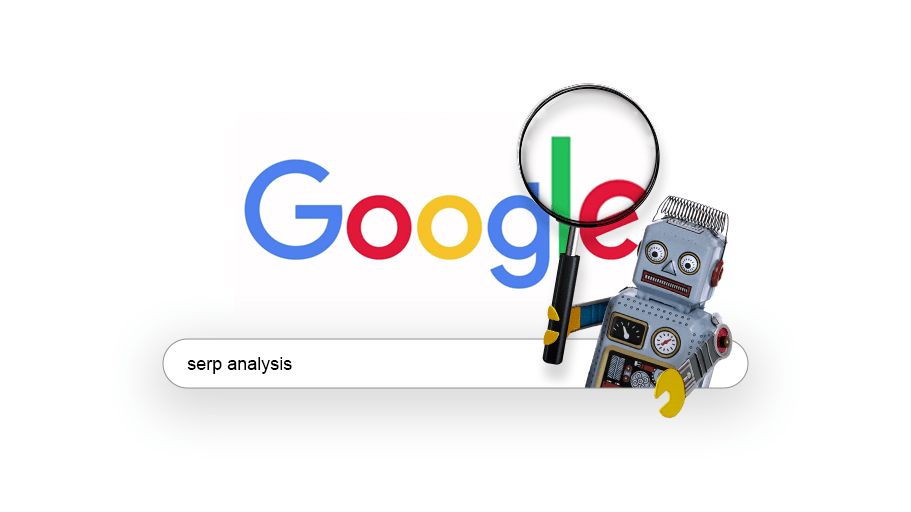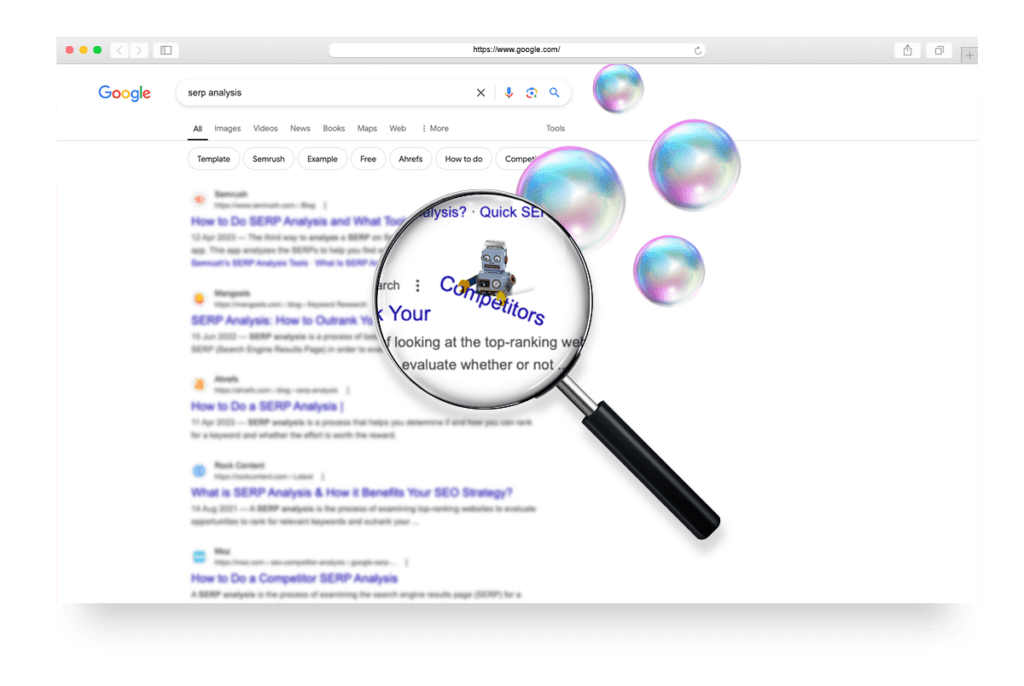We’ve spoken at length about the impact of AI on digital marketing in recent months. Within our articles, we’ve mentioned in passing how AI is going to be increasingly impacting search results. Well, for readers in the US, this hypothetical next step is now a reality!
AI-generated overviews (i.e. what used to be called SGE) have been rolled out to US search results. They’re powered by a new Gemini model, which is Google’s own version of the generative-AI that you’re probably most familiar with in the context of ChatGPT.
However, what exactly does this mean for you, both in terms of the here and now, and in the coming months and years? In this article, we’ll give you the essential details and also gaze into our digital marketing crystal ball to predict the future…
TL;DR: Google has rolled out AI-generative overviews in the US, and they’ll be coming to the UK soon. However, we don’t think that this development invalidates the need for quality content, SEO, and other digital marketing practices. On the contrary, we think that it’s simply the latest in a series of opportunities to “rank” on Google in different ways, so you still need to scrub up your digital presence!

Generative AI in Search in the US
The “AI overviews” that have arrived in the US are similar to the features that have been trialled in the UK. These overviews are AI-generated summary responses to users’ queries, and they appear alongside (or sometimes above!) normal website links on Google Search. The Guardian reports that more than a billion people across the world will have encountered these summaries by the end of the year. Google also has other plans in the works, including a text-to-video artificial intelligence model called Veo, and a new AI assistant with the working name of Project Astra.
Whether or not an AI overview will be shown to a searcher depends entirely on the discretion of the search engine. For instance, if a collated summary of lots of information from multiple sources is judged to best answer a query, then you might expect to see an AI response that tries to do this.
Sound OK so far?
Let’s now ask the obvious question that may be on your mind…
Is This the End of Organic Results?
Sure, perhaps that’s a little over dramatic, but will your keyword rankings drop?
Will your website get less traffic?
They’re perfectly natural concerns, but we’d like to frame them in the context of a wider long-term narrative.
Traditionally, digital marketers and website owners alike have been sceptical of anything on a search engine results page that’s not an organic website link or a paid ad. After all, doesn’t the existence of People Also Ask or schema-powered rich results push your web links lower down the page and make them less visible?
The short answer is that, yes, of course they do.
The longer answer acknowledges that digital marketers have also been highly effective at leveraging Google’s additional real estate. For instance, featured snippets are now commonly chased by content marketers, but concerns about “position 0” ranking over “number 1” used to be commonplace. And SEOs proved to be so capable of flooding search engines with FAQ-rich snippets that Google ultimately restricted them to only the most authoritative sources.
What we’re trying to say is that you shouldn’t panic. Google actually says this too, claiming that the organic links in AI overviews tend to get an above average click through rate (CTR). Of course, Google says a lot of things, and they don’t always get things right. You only have to look at the controversy over them being fined for favouring their Shopping ads over rival ads to see this. However, in this case, we agree with them; you shouldn’t worry, because your links will still get traction.
Many people will disregard AI overviews in the same way that lots of people disregard paid ads. Over time, we’re sure that AI overviews will become more commonplace, and trust levels will probably build up, but right now there’s still quite a lot of scepticism.
As always, we urge you not to be afraid of inevitable changes (after all, digital marketing changes all of the time!), but to make sure that you continue to work to reach your user base with relevant information.
Adapting to Changes in Search Results
As we’ve said, digital marketing changes constantly, and has done for years.
Nothing has ever made it irrelevant since it came into being.
At this point, it’s also worth reminding you that hastily-interpreted stats can be misleading! For instance, a few paragraphs ago we made the point that lots of people don’t click on paid ads. If you clicked on the article we linked to, the figure was actually 94%! But do we think that paid search is dead…?
Not at all!
Just ask our partner, Ideal4 Finance, who were able to increase their number of conversions by 71% with the help of our PPC management expertise. The key is always to use the right tool and adapt to the circumstances at hand.
So, what does that tell us about how to approach AI overviews in search results?
First up, if these overviews are going to include links, then you’re still going to want to work hard to keep your pages in tip top order. They should be full of relevant content that offers great value to your users, because the goal will be to coax the AI gods to notice them, draw from them, and link to them. And of course, if you’re going to make your pages that good, then why on earth wouldn’t you SEO them up to the gills so that they stand the best chance of appearing organically too?
In a sense, AI overviews are the latest in a long list of “alternative” opportunities to rank on search engines over the years.

The Zero-Click Elephant in the Room
Having talked so much about your organic links still being able to get traction, it might surprise you that we’re going to conclude by acknowledging that, sometimes, you shouldn’t worry too much about them getting clicks at all.
Like it or not, we’re already living in – and are journeying ever deeper into a zero-click world.
Rand Fishkin, founder of Moz, recently had a study carried out that shows that although 70% of all traffic referrals are from search, only 10% of people’s time is spent on search.
Even though we can’t fail to recognise that everyone spends most of their time on social media, productivity tools, apps, and other non-search environments, that’s still a shockingly low stat.
Google, YouTube, Facebook, Instagram, LinkedIn, TikTok, and any other platform wants you to stay put. They have a massive incentive to stop you going anywhere else! Native content with no links to an external blog post is commonplace: in fact, algorithms bias even marketers to share stuff in this way because it does better.
We’re all turning into people who click less on organic search results because:
- Many of us don’t even get that far.
- When we do get that far, our query is often answered by a zero-click solution (like a featured snippet, or a People Also Ask accordion).
It’s this last point that brings us right back to our earlier point that you shouldn’t panic. Sure, your old way of attributing value via clicks may not always work as well as it did, but is anyone seriously going to argue that a brand that’s totally dominating the zero-click real estate isn’t going to benefit from it?
Of course they’re not.
By all means, adapt your digital marketing efforts to go where your audience is consuming content. We all need to find the right message that appeals to the right people, in the right place, at the right time, and to the right audience. But make no mistake that this will continue to mean having a presence on SERPs.
With that in mind, rather than talking about the end of organic results from an SEO perspective, we should instead remind ourselves about what Google considers to be Helpful Content:
- Quality content that offers original or comprehensive analysis.
- Content with clearly descriptive headings and titles (i.e. SEO).
- Content that showcases experience, expertise, authority and trust.
- Content that offers a good page experience (i.e. UX-focused).
- Content that is written for people first.
- Content that transparently shows how it was created.
Get the picture? These are Google’s current guidelines, and you can bet your life that their AI overviews and zero-click features are going to be drawing upon pages that tick these boxes. So rather than worrying too much about search engines – which is literally a trap that they warn you against – you should instead focus on what your users want.
For instance, we know that users search in ways that go beyond simply typing out queries, so perhaps you should consider addressing conversational queries that are friendly to voice searchers? We know that image/video content is valuable to many searchers, and is effective across a wide range of disciplines like organic search, social media, and more, so maybe that would be an avenue to explore?
If you’re unsure exactly what sort of steps will give you the best chance to excel in a world of AI overviews, then don’t worry. We’re all in this together, and our experts have the long-term experience to know what the most reliable routes to success are likely to be.
What’s more, we can also help you to fill the gaps that are opening up because of the absence of traditional click-based attribution models. Our earlier point that you shouldn’t always worry about clicks is important, but we’re well aware that we all need to be able to measure the value of our marketing efforts. The goalposts may have changed, but we can help you to keep on landing your strikes.
Contact us to find out how we can help you with Google Search.
